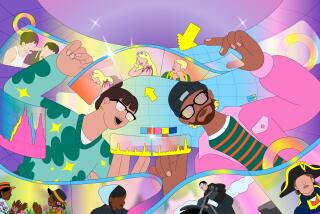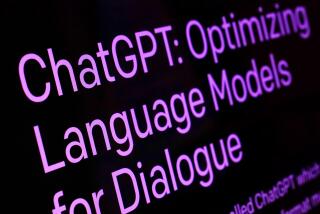Why Wiki can drive you wacky
- Share via
‘YOU DO NOT get to choose whether or not an article on you appears in Wikipedia, and you have no veto power over its contents. The article can cast you as a genius or an imbecile, a respected scientist or a crackpot.... a vandal could replace a page, any page, with total gibberish. The page on Einstein might have a statement inserted to the effect that he was a Nazi collaborator, or that his theories have been totally discredited, or that he was a silicon-based life form from Proxima Centauri.... Wikipedia does not operate by your rules but by its own conventions; I suggest you learn to accept it.... I can assure you resistance is futile.”
This was the lecture I received from anonymous Wikipedia “editor” KSmrq while I was in the midst of trying to bring some semblance of accuracy and neutrality to the “Bernard Haisch” article that another “editor” had posted a few days previously. I put “editor” in quotes because anyone can be a self-appointed editor. KSmrq’s user page says: “Although I do have personal history, interests, education and professional experience, I feel no compulsion to share them with the world on this page.” Now that inspires trust and confidence!
All it takes is a click of the mouse on the “edit this page” box and you too can add or subtract anything you want from virtually any article (a handful are blocked, e.g. George W. Bush), identity and relevant knowledge optional. Congratulations. You are now a Wikipedian.
But wait. If the article happens to be about you or your work, you are supposed to refrain from clicking on “edit this page.” Instead, if there are problems, you should click on the discussion page and politely argue your case there, in the hope that some other self-appointed editor will consider the merits of your case and fix things for you.
The belief among Wikipedians is that somehow, through a process of group trial and error, something credible will emerge by and by.
This is not always so, as a widely reported 2005 case showed. John Seigenthaler Sr., founder of the First Amendment Center at Vanderbilt University and a former assistant to Robert F. Kennedy, discovered in September 2005, via a tip from a friend, that for the previous four months his Wikipedia entry had included this statement, inserted by an anonymous editor: “John Seigenthaler Sr. was the assistant to Attorney General Robert Kennedy in the early 1960s. For a brief time, he was thought to have been directly involved in the Kennedy assassinations of both John, and his brother, Bobby. Nothing was ever proven.”
An Op-Ed article that Seigenthaler published in USA Today detailed his frustrating and failed attempts to track down the source of this statement. The perpetrator eventually came forward with an apology and an explanation that it had been a joke gone bad.
Some might view this as an example of the worst that could happen and proof that the system did eventually root out the misinformation.
I disagree. Something as blatantly wrong as this will be fixed sooner or later. What is more insidious are the negative slants and biased cherry picking of facts that can paint a quite inaccurate portrait of something or someone. This is as hard to fix as a flat tire in a blizzard. And if it does get fixed, it could change again five minutes hence.
Unfortunately, telling yourself that it really doesn’t matter what Wikipedia says is not a realistic option anymore. Wikipedia is growing rapidly in its number of articles and users, and for many people Wikipedia will be the first and only source they’ll see.
Of course, Wikipedia will have its facts straight when it comes to the Pythagorean theorem or the periodic table. But that does not translate into accuracy and unbiased articles on more subjective or controversial topics, especially people.
To be sure, the rules -- which amazingly are also freely editable -- state that there are policies, such as a “Neutral Point of View” that “editors” should follow. Some do and some don’t, but most of them are quick to edit your edits if you dare to correct facts or misinterpretations about yourself. Wikipedia editors are judge, jury and prosecutor.
What brought about my Wikipedia battle? As part of my mainstream career in astrophysics, I did NASA-sponsored research and served for 10 years as one of the scientific editors of the leading journal in that field, the Astrophysical Journal. But simultaneously I edited the Journal of Scientific Exploration, which attempts to provide a scientific forum for critical discussion of unorthodox topics, such as parapsychology and analysis of UFO reports, some of which had mundane explanations. I did this as an unpaid public service.
I discovered in June that a Wikipedia editor had written an article on me that concentrated almost solely on the latter topics while virtually ignoring the 100-plus scientific papers I had published. It was a draining editing battle to try to coax the article into something halfway reasonable, which was helped by the decision of the “editor” to drop out of Wikipedia. But the article could again be rewritten by another anonymous editor. Of course, you too might decide to edit my article. Please refrain.
As for me, Oscar Wilde once said: “The only thing worse than being talked about ... is not being talked about.” It’s a small consolation.
More to Read
Sign up for Essential California
The most important California stories and recommendations in your inbox every morning.
You may occasionally receive promotional content from the Los Angeles Times.












